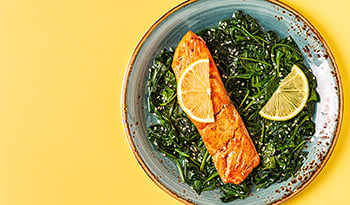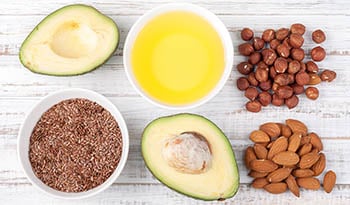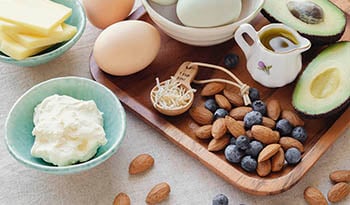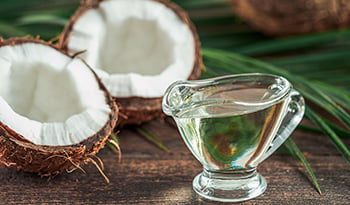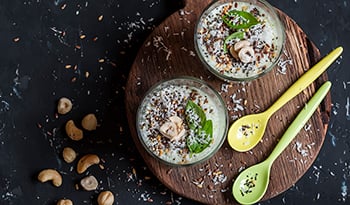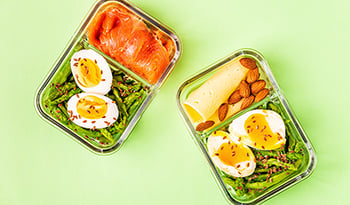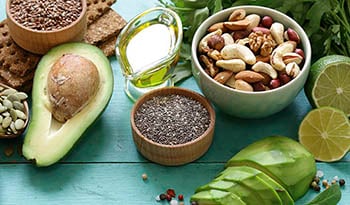10 elemente esențiale și suplimente alimentare pentru a sprijini sănătatea în dieta Keto

La fel ca unele automobile, ființele umane sunt „hibrizi” atunci când vine vorba de consumul de energie. Putem folosi zahăr (glucoză sau carbohidrați simpli) sau acizi grași pentru a satisface cerințele noastre zilnice de energie. Cu toate acestea, nu putem decide pur și simplu să folosim unul sau altul - corpul nostru va arde mai întâi zahărul dacă este disponibil și orice zahăr care este consumat, dar nu ars, va ajunge în cele din urmă să fie depozitat ca exces de grăsime.
Când aportul zilnic de carbohidrați simpli (pâine, paste, orez, dulciuri, unele fructe etc.) este redus, corpul nostru va începe să ardă grăsimi pentru energie. Cu toate acestea, grăsimea trebuie mai întâi descompusă în cetone. Aceasta este baza a ceea ce se numește dieta ketogenică sau keto.
Mulți au experimentat pierderi semnificative în greutate prin adoptarea acestui stil de alimentație. Principala premisă a dietei keto este că o persoană ar trebui să consume 70% din caloriile sale (nu alimentele totale) din grăsimi sănătoase, 25% din caloriile sale din proteine și aproximativ 5% din caloriile zilnice din carbohidrați simpli - cu alte cuvinte, este un plan alimentar bogat în grăsimi sănătoase, moderat în proteine și scăzut în carbohidrați simpli. Dieta keto recomandă păstrarea carbohidraților simpli (care se transformă în zahăr) la mai puțin de 50 de grame (sau 20-25 carbohidrați neti) pe zi.
Istoria dietei ketogenice
Dieta keto nu a fost întotdeauna folosită pentru pierderea în greutate. Inițial, a fost un tratament pentru convulsiile rezistente la medicamente când s-a observat încă din anii 1920 că unii copii cu convulsii care nu au răspuns la medicamentele anti-convulsii au răspuns favorabil la o dietă ketogenică. În multe cazuri, convulsiile ar dispărea cu totul atâta timp cât dieta a fost respectată.
În aceste zile, dieta ketogenică a fost adoptată ca o strategie populară de pierdere în greutate. Mulți care consumă diete cu conținut scăzut de carbohidrați/bogate în grăsimi (LCHF) raportează că se simt mai energizați, mai ales că excesul de greutate începe să scadă. Deși acest lucru este promițător pentru cei care doresc să slăbească, ca în cazul oricărei diete, consultați medicul înainte de a începe pentru a vă asigura că este alegerea potrivită pentru dvs.
Exemple de alimente permise în dieta ketogenică
- Produse lactate: smântână grea, lapte de migdale, lapte de cocos, brânzeturi, iaurt grecesc (toate neîndulcite)
- Grăsimi: unt de migdale, ulei de avocado, ulei de nucă de cocos, unt, ulei de semințe de in, ulei de semințe de struguri, ulei de semințe de cânepă
- Legume fără amidon: broccoli, varză, castraveți, kale, rucola, usturoi, jalapeno, spanac (practic, legume care cresc deasupra solului)
- Fructe cu conținut scăzut de zahăr: avocado, afine, căpșuni, zmeură, cireșe
- Păsări de curte: pui, curcan
- Carne: carne de vită, carne de porc, vițel
- Fructe de mare: bas, crab, somon, tilapia, tonetc.
- Nuci și semințe: migdale, nuci braziliene, caju, nuci pecan, fistic, semințe de dovleac
Cum procesăm zahărul
Celulele corpului folosesc zahărul (glucoza), care vine în mai multe forme, ca sursă principală de energie. Zahărul inutil este depozitat în ficat și mușchi sub formă de glicogen. Oamenii pot stoca o cantitate de glicogen de 72 de ore, permițând zahărului să fie disponibil în caz de foame și când este nevoie de o sursă rapidă de energie.
Această stocare oferă un avantaj evolutiv, permițând oamenilor să supraviețuiască foametei. Cu toate acestea, atunci când foametea nu apare și o persoană consumă mai mult zahăr decât este necesar, va avea loc depozitarea grăsimilor.
Cum funcționează dieta Keto?
Scăderea carbohidraților și aportul scăzut de zahăr al dietei ketogenice determină excesul de grăsime să se spargă în acizi grași liberi. Acești acizi grași sunt apoi transformați în energie, generând cetone de către ficat.
Când o persoană își minimizează aportul simplu de carbohidrați la mai puțin de 50 de grame pe zi (20-30 carbohidrați neti) și rămâne activă fizic, va apărea cetoza.
Din experiența mea, odată ce obiectivele de pierdere în greutate sunt atinse, este important să alegeți o zi pe săptămână când se consumă fructe (banane, mere etc.) și carbohidrați mai sănătoși (orez brun, quinoa, paste, paste, paste cu linte, ignamuri etc.) - acest lucru ajută la menținerea flexibilității metabolice.
Produse alimentare cu dietă Keto
Ulei de avocado
Avocado este popular printre cei care aderă la o dietă ketogenică. Cu toate acestea, puțini își dau seama că ulei de avocado poate fi consumat și el. Este un ulei excelent pentru a găti, deoarece are un punct de fum ridicat de 520 grade Fahrenheit (271 Celsius), ceea ce înseamnă că este stabil până la această temperatură.
Uleiul de avocado constă din acid linoleic, acid oleic și alți acizi grași mononesaturați, care sunt grăsimi sănătoase cu proprietăți antiinflamatorii. Se crede că acești acizi grași nu numai că scad colesterolul și tensiunea arterială, dar stimulează și pierderea în greutate. O lingură de ulei de avocado conține 124 de calorii, 14 grame de grăsimi și fără carbohidrați. Uleiul de avocado nu este un ulei MCT (trigliceride cu lanț mediu) .
Ulei de nucă de cocos
Uleiul de nucă de cocos este unul dintre cele mai populare MCT-uri și este frecvent utilizat pentru beneficiile sale pentru sănătatea creierului și pentru a ajuta la pierderea în greutate. Un studiu din 2009 a arătat că consumul timp de 12 săptămâni a dus la reducerea greutății în jurul taliei. Uleiul de nucă de cocos are un punct de fum de 350 de grade Fahrenheit (177 grade Celsius) și este o opțiune excelentă atunci când gătiți la temperaturi scăzute, medii sau ridicate. O lingură de ulei de nucă de cocos conține 117 calorii, 14 grame de grăsimi și fără carbohidrați.
Ciocolată, prăjituri și prăjituri
Știu ce gândești! Nu există nicio modalitate de a exista prăjituri keto, prăjituri keto, brownies keto și alte gustări keto care sunt permise atunci când mănânci o dietă ketogenică.
Din fericire, îndulcitorii naturali, fără calorii și făină de migdale sau făină de nucă de cocos fac acest lucru posibil. Deși nu recomand ca acestea să fie consumate zilnic, ele sunt o alternativă satisfăcătoare atunci când sunteți pe punctul de a vă sufla dieta cu conținut scăzut de carbohidrați pentru o încântare temporară plină de zahăr.
Ghee
Cunoscut și sub denumirea de unt clarificat, ghee este popular printre cei care urmează dieta ketogenică. A jucat un rol important în medicina ayurvedică și este utilizat pentru proprietățile sale antiinflamatorii și digestive.
Ghee conține atât trigliceride cu lanț scurt, cât și cu lanț mediu și este bogat în omega-3 și acid butiric, motiv pentru care probabil are beneficii intestinale. De asemenea, conține vitaminele A, Eși K. Ghee poate fi adăugat la orice rețetă alimentară care folosește în mod normal unt. De asemenea, se adaugă la cafea pentru cei care doresc să-și crească aportul zilnic de grăsimi.
Ulei de trigliceride cu lanț mediu (ulei MCT)
Trigliceridele cu lanț mediu (MCT) pot juca, de asemenea, un rol important pentru cei care încearcă să slăbească. Mulți care urmează un supliment alimentar ketogen cu MCT, care sunt utilizate pentru energie și sunt mai puțin susceptibile decât trigliceridele obișnuite cu lanț lung să fie stocate sub formă de grăsime.
Un studiu din 2015 a arătat că MCT-urile ar putea ajuta modest la reducerea greutății corporale la cei care le consumă. În plus, nu a existat o creștere a nivelului de colesterol din sânge. Pot fi luate de linguriță sau pur și simplu adăugate la smoothie-uri. Sugerați doza: conform indicațiilor de pe etichetă.
Nuci
Există multe tipuri de nuci, fiecare conținând o varietate de vitamine și minerale. Datorită concentrației ridicate de acizi grași esențiali, nucile sunt o sursă excelentă de grăsimi sănătoase și proteine. Împreună cu beneficiile lor cardiovasculare și cerebrale, sunt, de asemenea, o gustare ceto excelentă pentru a ajuta la îndepărtarea poftelor.
- Migdale: Bogate în calciu, magneziu și vitamina E.
- Caju: Bogat în fier și bogat în magneziu și o sursă excelentă de cupru cu micronutrienți.
- Alune: Bogate în vitaminele C și B, precum și calciu și magneziu.
- Arahide: Leguminoasele prin definiție, arahidele sunt o sursă excelentă de proteine, fibre și grăsimi sănătoase. Sunt bogate în L-arginină, un aminoacid important pentru circulație și sănătatea inimii. Studiile arată că arahidele sunt o sursă bună de resveratrol, care are beneficii anti-îmbătrânire și longevitate.
- Nuci: Bogate în acizi grași omega-3 și antioxidanți, care pot ajuta la scăderea colesterolului.
Semințe
- Semințe de chia : O sursă excelentă de proteine și acizi grași omega-3, semințele de chia s-au dovedit a avea numeroase beneficii pentru sănătate și pot funcționa bine pentru cei care doresc să slăbească, deoarece par să ajute și la scăderea zahărului din sânge. De fapt, un studiu din 2010 în Jurnalul European de Nutriție Clinică a arătat că semințele de chia ar putea ajuta la scăderea zahărului din sânge și a tensiunii arteriale la cei cu diabet zaharat.
- Semințe de cânepă: O sursă excelentă de nutriție care a fost consumată de mii de ani. Adăugarea semințelor de cânepă la dieta cuiva este importantă, mai ales atunci când sunteți pe dieta ketogenică. Semințele de cânepă conțin peste 30% grăsimi și sunt bogate în acidul gras omega 3 alfa-linolenic și acidul linoleic omega-6 sănătos. Ele sunt, de asemenea, o sursă excelentă de proteine care pot fi adăugate la smoothie-uri, salate și gustări cu bombe ceto-bombe.
Îndulcitori
Aportul ridicat de zahăr de masă sau zaharoză este un motiv major pentru care tot mai mulți oameni din întreaga lume suferă de obezitate, diabet și hipertensiune arterială. Zaharoza este ceea ce oamenii de știință numesc dizaharidă, ceea ce înseamnă că este o combinație de glucoză și fructoză.
Înainte de anii 1600, aportul zilnic de zahăr era în esență nemaiauzit. Cu toate acestea, în ultimele câteva sute de ani, zahărul a devenit omniprezent și duce la boli cronice. Din fericire, există alternative mai sigure, cum ar fi fructe de călugăr, aluloză, eritritolsau stevia.
Fibră
Pentru unii, o dietă cu conținut scăzut de carbohidrați poate provoca constipație. Ca urmare, este important să rămâneți bine hidratat. Adesea le spun pacienților mei să ia în considerare un supliment de fibre dacă apare constipație. Luați conform instrucțiunilor.
Batoane proteice
Batoanele proteice sunt o gustare excelentă sau un înlocuitor de masă pentru cei care urmează o dietă keto. Asigurarea faptului că au un conținut scăzut de carbohidrați neti este important pentru a vă asigura că rămâneți sub obiectivul zilnic de carbohidrați. De multe ori iau batoane proteice cu mine când călătoresc.
10 elemente esențiale pentru suplimentul Keto
Următoarele suplimente pot ajuta la susținerea sănătății pentru cei care urmează dieta ketogenică.
1. colagen
Această proteină este cunoscută și sub denumirea de țesut conjunctiv și este responsabilă pentru stabilizarea pielii noastre și menținerea mișcării și flexibilității articulațiilor. Suplimentarea cu colagen are multe beneficii, care includ reducerea ridurilor faciale și ajutarea la minimizarea celulitei. Cei care slăbesc pe o dietă ceto pot lua în considerare luarea de colagen suplimentar pentru a se asigura că sănătatea pielii este optimizată. Recomand cel puțin 3.000 până la 5.000 mg zilnic.
Ar trebui luată în considerare administrarea suplimentară de 1.000 până la 2.000 mg de vitamina C pentru a ajuta la optimizarea rezistenței și producției de colagen.
2. Pulberi electrolitice
O problemă comună pentru unii care urmează o dietă ketogenică este anomaliile electrolitice. La început, dacă nu se administrează suficient lichid, poate apărea deshidratarea, ducând la anomalii ale magneziului și potasiului. A rămâne bine hidratat este esențială. Cei care se antrenează și transpiră în mod regulat sunt cel mai expuși riscului de anomalii electrolitice. Drept urmare, mulți consumă pulberi electrolitice pentru a ajuta la asigurarea completării.
3. Cetone exogene
Aceste suplimente ( beta-hidroxibutirat ) și băuturi sportive au devenit populare în ultimii ani. Un studiu din 2017 a concluzionat că „băuturile cetonice exogene sunt o modalitate practică și eficientă de a obține cetoza”. Studiile arată, de asemenea, că pot suprima pofta de mâncare și pot scădea nivelul trigliceridelor și glucozei. Notă: luarea acestui supliment nu elimină necesitatea de a limita consumul de carbohidrați simpli atunci când sunteți pe o dietă ketogenică.
4. Băuturi verzi
Contrar a ceea ce mulți cred, o dietă ketogenică ar trebui să fie bogată în legume cu frunze verzi, care sunt carbohidrați complexi și bogate în fibre. Consumul de cantități adecvate de fitonutrienți și fibre este important. Cu toate acestea, acest lucru nu este întotdeauna ușor de realizat pentru unii oameni doar prin dietă, așa că adăugarea pulberi verzi poate fi de un beneficiu suplimentar. Multe băuturi verzi conțin iarbă de grâu, chlorella și multe alte legume.
5. magneziu
Magneziul este implicat în peste 350 de reacții biochimice. În perioadele de stres fizic și mental, acest mineral este utilizat mai mult de organism, ceea ce explică probabil relația dintre durerile de cap de tensiune, spasme și palpitații cardiace în perioadele mai stresante ale vieții. Mai mult, acest macro-mineral este luat în mod obișnuit pentru a ajuta la prevenirea crampelor musculare, care apar uneori la cei care urmează o dietă ketogenică sau la cei cu un stil de viață activ.
Chelatul de magneziu (aspartat de magneziu, citrat de magneziu, malat de magneziu) este o formulă preferată pentru crampe și dureri de cap la o doză zilnică de 125 mg până la 500 mg. Deoarece constipația este comună pentru cei care urmează o dietă ceto, utilizarea magneziului poate ajuta la menținerea regulată a mișcărilor intestinale. Pentru cei care au mai multă constipație decât crampe, trebuie luate în considerare citratul de magneziu sau oxidul de magneziu.
6. Multivitamine
La 19 iunie 2002, un studiu publicat în Jurnalul Asociației Medicale Americane a recomandat ca toți adulții să ia multivitamine. O asigurare suplimentară că organismul primește ceea ce are nevoie, o multivitamină de calitate oferă nutrienți suplimentari atunci când este consumat cu o dietă săracă în carbohidrați sau ketogenică. Doza recomandată: conform recomandărilor de pe etichetă
7. Omega-3
Dieta ketogenică este o dietă bogată în grăsimi, iar consumul de cantități mari de grăsimi sănătoase este crucial. Acizii grași Omega-3 și/sau uleiurile de pește pot juca un rol important în asigurarea unor grăsimi sănătoase adecvate în dietă. Cele mai multe suplimente cu o doză de 1.000 până la 4.000 mg pe zi. Semințele de in sunt o alternativă bună pentru cei care sunt vegani.
8. Proteine de mazăre
Un shake de înlocuire a mesei de proteine din mazăre sau pulbere de proteine vegetale trebuie luate în considerare de cei care urmează o dietă ketogenică. Proteina din mazăre este recomandată celor care evită produsele lactate, în special celor care urmează o dietă vegană. O porție are mai puțin de un gram de carbohidrați. Doza recomandată: conform recomandărilor de pe etichetă.
9. Vitamina D
Deficitul de vitamina D este unul dintre cele mai frecvente deficiențe de vitamine la nivel mondial. Cei care urmează o dietă ketogenică sunt, de asemenea, sensibili. Nivelurile scăzute de vitamina D din sânge sunt asociate cu un risc crescut de osteoporoză, atacuri de cord, accidente vasculare cerebrale și multe tipuri de cancer. Majoritatea adulților care au deficit de vitamina D suplimentează cu 2.000 până la 5.000 UI zilnic pe viață.
10. Proteine din zer
Un supliment obișnuit folosit de cei care fac exerciții fizice în mod obișnuit, proteina din zer este frecvent utilizată ca înlocuitor al mesei de către cei care încearcă să mențină sau să slăbească. Derivat din laptele de vacă, este, de asemenea, o sursă populară de proteine în rândul persoanelor care încearcă să construiască mușchi. Un shake de proteine din zer poate fi folosit ca înlocuitor de masă pentru cei care urmează dieta keto. Doza recomandată: conform recomandărilor de pe etichetă.
Referințe:
- Accesat la 10 iulie 2021 https://www.farmersalmanac.com/ten-amazing-benefits-of-avocado-oil-21992
- Lipide. 2009 iulie; 44 (7): 593-601. doi: 10.1007/s11745-009-3306-6. Epub 2009 13 mai.
- Dieta J Acad Nutr. 2015 februarie; 115 (2): 249-63. doi: 10.1016/j.jand.2014.10.022.
- Conținutul de trans-resveratrol în arahide comerciale și produse de arahide Victor S. Sobolev* și Richard J. Cole Journal of Agricultural and Food Chemistry 1999 47 (4), 1435-1439 doi: 10.1021/JF9809885
- Eur J Clin Nutr. 2010 aprilie; 64 (4): 436-8. doi: 10.1038/ejcn.2009.159. Epub 2010 20 ianuarie.
- Stubbs BJ, Cox PJ, Evans RD, Santer P, Miller JJ, Faull OK, Magor-Elliott S, Hiyama S, Stirling M, Clarke K. Despre metabolismul cetonelor exogene la om. Fiziol frontal. 2017 30 oct.; 8:848.
- Fletcher RH, Fairfield KM. Vitamine pentru prevenirea bolilor cronice la adulți Aplicații clinice. JAMA.2002; 287 (23): 3127—3129. doi: 10.1001/jama.287.23.3127
Declarație de declinare a responsabilității:Acest blog nu are ca scop să ofere un diagnostic.














































































 Cuprins
Cuprins




